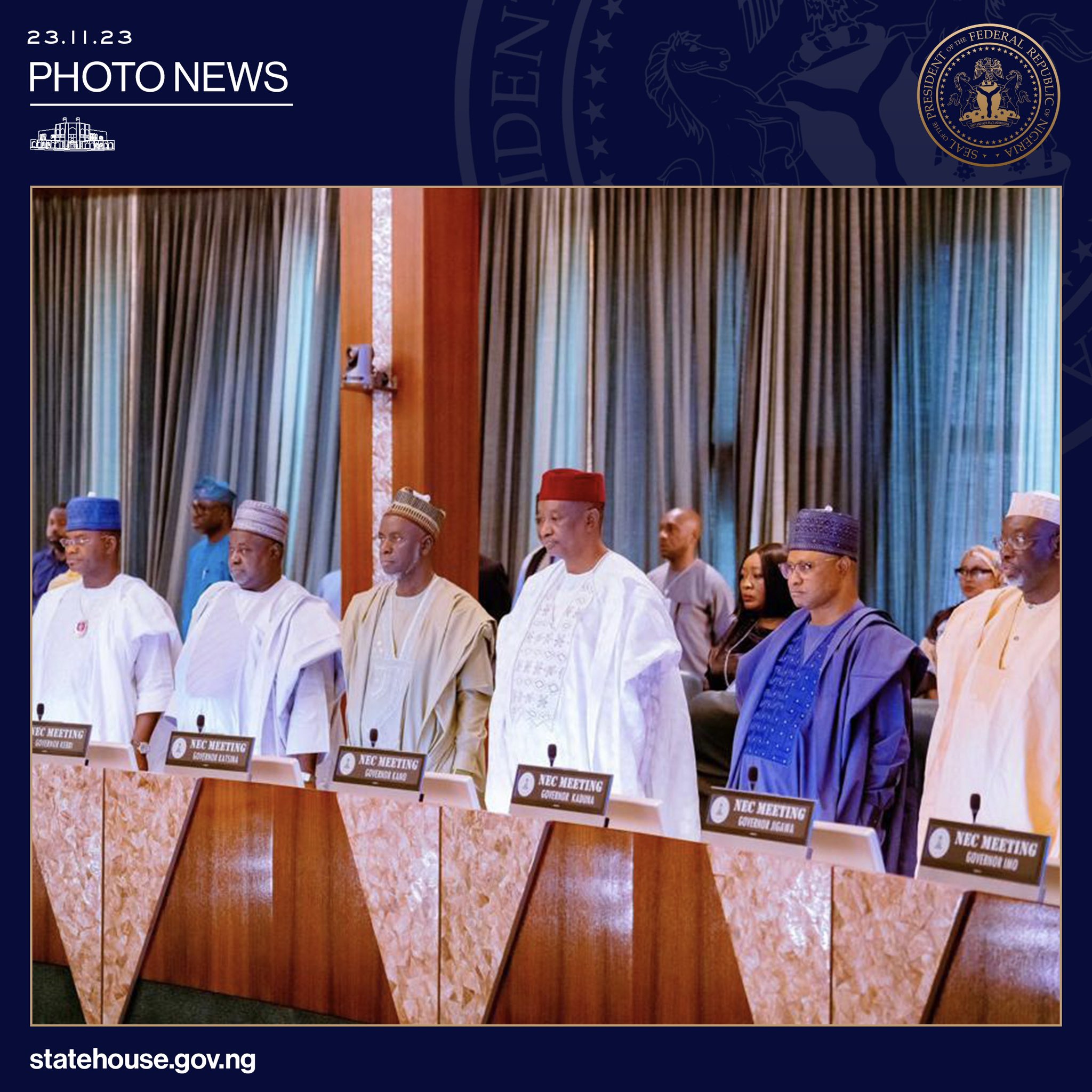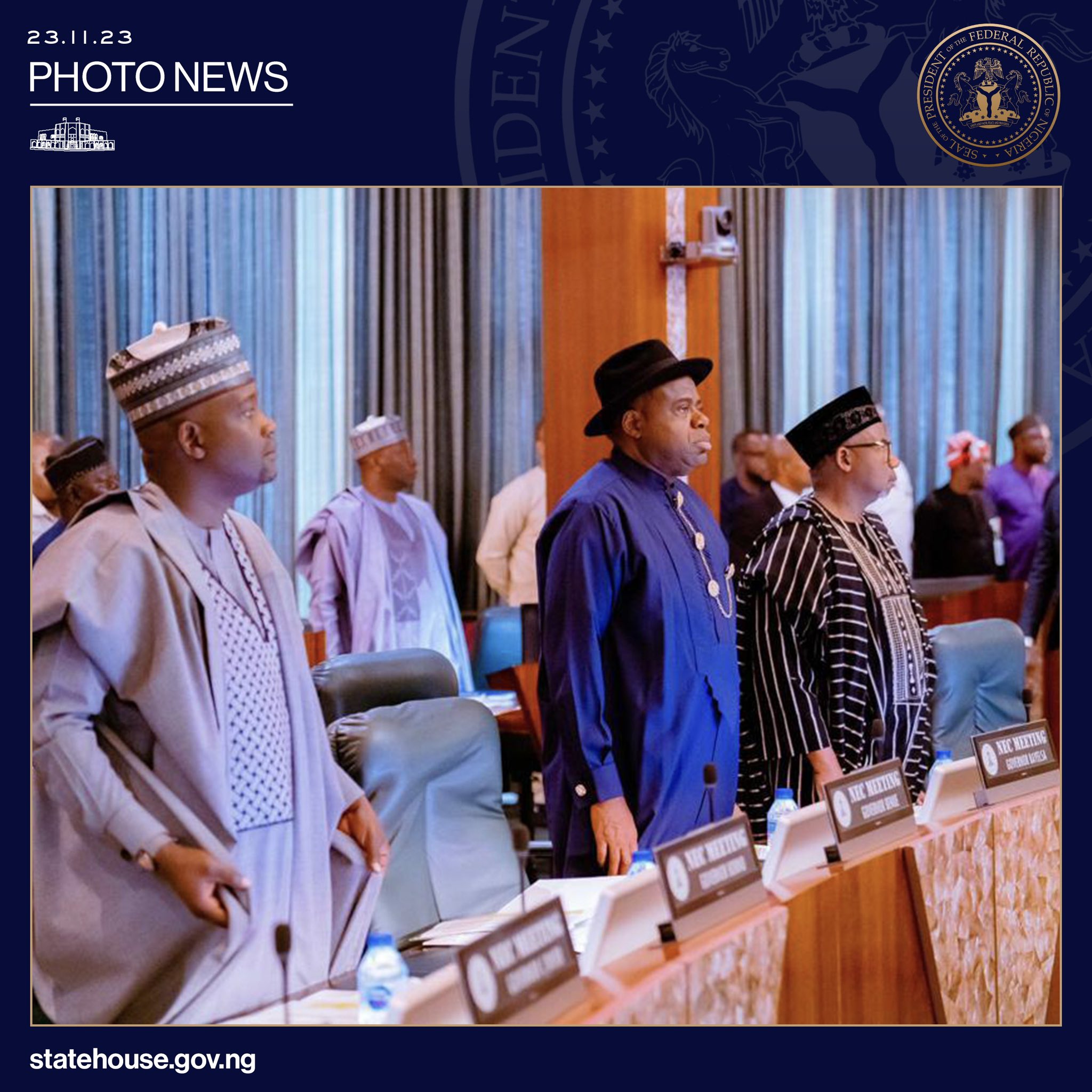Read Full Details on 137th NEC MEETING: We Must Develop Our Agric Sector To Self-Sufficiency – VP @officialsksm Tells Governors

StateHousePressRelease
..SAPZs, Natural Catastrophe Insurance Fund, Health/Human Capital, NEC Retreat, National Flood Mitigation Roadmap , Others Top Agenda

The Vice President, Sen. Kashim Shettima, has implored Governors of the 36 states of the federation to work towards revamping Nigeria’s agricultural sector, with a view to reducing dependence on food imports and attaining greater food self-sufficiency.

This, he noted, resonates well with the investments and commitment of the African Development Bank (AfDB) to establishing Specialised Agro Processing Zones (SAPZ) in the country.

Sen. Shettima gave the charge on Thursday during the 137th meeting of the National Economic Council (NEC) held at the Council Chamber of the Presidential Villa, Abuja.

The Vice President is the Chairman of NEC, a statutory body that has the mandate to advise the President on the nation’s economic affairs, with the Governors of the 36 states of the federation, the Governor of the Central Bank of Nigeria (CBN), Minister of Finance and other stakeholders as members.
While delivering his opening address at the meeting, VP Shettima said, “Our upcoming task must be rooted in recognizing the agrarian nature of our economy. We must strive for deliberate value addition in the agricultural sector, moving away from commodity exports towards job creation.
“Collaboration is vital in enabling the Specialized Agro Processing Zones (SAPZ) Programme spearheaded by the Ministry of Agriculture and Rural Development in partnership with the Africa Development Bank (AfDB).
“Your Excellencies, we must develop our agricultural sector towards self-sufficiency and exporting processed agricultural products in line with the African Union’s Africa 2063 Agenda. This also aligns with AfDB’s investments and commitment to establishing the SAPZ. Collaboratively, we should harness our agricultural comparative and complementary advantages across the value chains of priority crops within the SAPZ.”
The Vice President also hinted about the possibility of engaging the private sector in tackling floods and other natural disasters, saying considering the financial implications of managing natural disasters, the government cannot do it alone.
He continued: “While urging unity as the nation’s hope, I am aware of the financial implications of managing natural disasters. We cannot tackle this alone. Innovative capital pools from the private sector can help share and mitigate fiscal and economic risks posed by such disasters. This approach has been successful in other African countries, preparing for low-probability yet highly disruptive ‘black swan’ events.
“Once again, we find ourselves bearing the weight of the nation. Since our last gathering, much has transpired, with each event punctuated by the nation’s reactions. None of us here requires a reminder of the direction we are headed or what is required to ensure that we stand together through the storm to fulfill our promises to the people. It gives me great pleasure to welcome you back, back to the 137th meeting of the National Economic Council, our engine room”.
Recalling that President Bola Ahmed Tinubu had recently highlighted eight presidential priorities for his administration, which serve as a conduit to his Renewed Hope Agenda, Shettima told the governors and other members of Council to get “involved in seeking both short-term palliative and enduring solutions to the consequences of our reforms.”
Meanwhile, other highlights of the meeting are as follows:
Update on ECA
1. Excess crude account (ECA) as at September,
$473,754.57
2. Stabilization as at September,2023
#37,597,965,211.43
3. Current Balance of Natural Resources
#144,683,136,928.25
PRESENTATION ON STATE BUDGET SUPPORT FACILITY AS AT 30TH NOVEMBER, 2023 FAAC MEETING BY OFFICE OF THE ACCOUNTANT GENERAL OF THE FEDERATION
States Outstanding Liability
1 FCT 49,105,873,326.75
2 36 States 49,105,873,326.75
3 Total 1,718,705,566,436.25
NOTE: The budget support loan was stopped in July 2023. The decision was taken to set aside an amount from the Federation Account to take care of the balance.
PRESENTATION ON THE REPORT OF THE COMMITTEE ON FLOOD MITIGATION, ADAPTATION, PREPAREDNESS AND RESPONSE BY GOVERNOR YAHAYA BELLO OF KOGI STATE
The Memo was on the comprehensive roadmap for Flood Mitigation, Adaptation, Preparedness, and Response in Nigeria. The committee was charged with the critical task of developing a comprehensive roadmap for Flood Mitigation, Adaptation, Preparedness, and Response in Nigeria. The roadmap’s foundation will be the review and harmonisation of existing reports and policy documents that are critical to this endeavor. The overarching goal of this roadmap is to establish a sustainable approach to flood risk management that safeguards human life and property, all while encouraging the conservation and improvement of water-related ecosystems.
The roadmap is structured into three distinctive stages, spanning immediate (0 – 1 year), short-term (1 – 5 years), and medium-term (1 – 8 years) timelines. Each stage encompasses a wide spectrum of activities designed to address different facets of flood risk management, including mitigation, adaptation, preparedness, response, and recovery. Noting the absence of a centralized coordinating mechanism for flood mitigation, adaptation, preparedness, and response in Nigeria, the roadmap advocates for the establishment of a National Flood Management Council (NFMC). The NFMC is envisioned to provide the vital direction required for internal coordination among agencies involved in flood-related disaster management. It will also play a pivotal role in advising the President on the declaration of a State of Emergency in response to the severity of the flood situation.
The committee’s report was based on the recommendations and findings of previous research efforts namely: the Preliminary Assessment of the Impact of Flood Disaster by the NEC Ad-hoc Committee; the National Flood Emergency Preparedness and Response Plan (2022) by the Federal Ministry of Humanitarian Affairs; the Report of the Presidential Committee on Development of a Comprehensive Plan of Action for Preventing Flood Disasters in Nigeria (2022), and several other policy documents relating to flood disaster and response in Nigeria.
Floods, driven by a confluence of natural hydro-meteorological processes and exacerbated by climate change, pose a growing risk to regions across the world. Nigeria, too, finds itself vulnerable to this peril, owing to inadequate flood planning, unwise human settlements in flood-prone areas, and serious disruption of natural processes. The result has been a decade of escalating damage and loss of life, particularly in the wake of devastating flood events in 2012, 2018, and 2022. In response to this pressing concern, a series of governmental agencies have mobilised, forming committees to assess and devise flood management strategies.
Roadmap
The roadmap is guided by insights from the National Economic Council (NEC) Report on Flood and reviews of two foundational reports on flood, namely, the Presidential Committee Report on the Development of a Comprehensive Plan of Action for Preventing Flood Disasters in Nigeria, and the National Flood Emergency Preparedness and Response Plan 2022, in addition to other relevant policy documents on flood disaster and response in Nigeria. As per defined terms of reference, the Committee has devised a comprehensive roadmap, outlining critical interventions necessary for charting a course towards addressing the menace of flooding in Nigeria. The roadmap identifies implementation timelines and responsible lead agencies, while also recognizing and leveraging the involvement of other relevant stakeholders.
Furthermore, the roadmap is divided into distinct timelines as follows꞉ i. Immediate and immediate/continuous (0 – 1 year) – these activities take cognisance of the 2023 flood outlook for the months of October, November and December and provide immediate response and emergency livelihood support to persons at risk of impending flood disaster.
ii. Short-term and short-term/continuous (1 – 5 years), and
iii. medium-term and medium-term/continuous (1 – 8 years)horizons encompass various parts of the flood risk management cycle -mitigation, adaptation, preparedness, response, and recovery- ensuring a robust and actionable strategy that safeguards the nation from the destructive nature of flooding.
RECOMMENDATIONS
Given that flood management is cross-cutting and multi-sectoral, requiring a comprehensive structure guided by strong frameworks and policies, the committee recommended the establishment of a National Flood Management Council to be domiciled in the Office of the Vice President. It also recommended the following:
• The categorization of Nigerian floods as an important tool for understanding and managing flood hazards in the country.
• On the advice of the proposed council, the President should declare a state of emergency when a category 4 flood occurs.
• Annual Budgetary Provision (for Federal, State and Local Government)
• Ecological fund (For Federal and State)
• Immediate response and intervention to flood disaster during the 2023 rainy season in Nigeria.
• Institutional framework and coordination
• Strengthening of data management for effective early warning
• Capacity building
• Policy shift toward adaptation and resilience
Council Resolutions:
Council noted and commended the effort of the committee and called for better coordination and commitment from all stakeholders in the activation of flood intervention activities across the country.
Council also noted that the creation of a dedicated office on flood management was not necessary given Mr President’s appointment of a Special Adviser on Climate Change to coordinate, in partnership with other stakeholders, issues related to flooding and Climate Change in Nigeria.
PRESENTATION ON SPECIAL AGRO-INDUSTRIAL PROCESSING ZONE (SAPZ) PROGRAMME BY SENATOR ABUBAKAR KYARI, MINISTER OF AGRICULTURE AND FOOD SECURITY
• Engagement of Design and Supervision consultants
• Design stage
• Approvals/Permits
• Engagement of Contractor
• Site Handover
Council Resolutions:
Council called on State Governments to get on board and key into the SAPZ programme and transform agricultural practice in their respective domains.
The Vice President noted that the selection of States in the next phase of the SAPZ programme would be determined by the commitment and determination of each State government. He urged State governments to maximize the benefits of opportunities created by multilateral organisations headed by Nigerians such as the African Development Bank and AFREXIM Bank….
The plan underscored the importance of clearly defined funding mechanisms as raising funds to achieve our health outcomes targets requires key actions from federal and state governments over the next 4 years.
The presentation also highlighted the options for a renewed compact with states, including, raising more revenues at both federal and sub-national levels as a matter of priority; increasing budget allocations to health at both federal and sub-national levels, and aligning development assistance for health.
RECOMMENDATIONS
The memo recommended better and increased spending for health to ensure more accountability, greater alignment and less fragmentation. This is premised on the fact that while Nigeria’s health sector currently benefits from substantial international assistance, because there is no systematic operational coordination, there’s a sense that potential synergies and complementarities are not being realized.
Other recommendations include:
• Allocate and release an increasing percentage of state funds
• Agreed counterpart funding scheme
• Joint bi-annual program review meetings
• State implementation oversight under the leadership of the state governor
• State institutional and governance responsibility
• Operationalisation of the National Health Act.
Council Resolutions:
Council noted and commended the efforts of the health ministry in reforming healthcare delivery in the country. Members pledged their cooperation and commitment to some of the recommendations, especially scaling up collaborations with development partners in a manner that ensures access to healthcare services across the country.
PRESENTATION ON NATIONAL CATASTROPHE INSURANCE
The presentation is a proposal to NEC for the adoption of a Pula initiative, a programme for the development of parametric crop Insurance through yield & weather index Insurance- covering drought, flood, locusts, cyclones and diseases. It also covers 22 crops – maize, rice, wheat (80%) as well as pulses, oilseeds, sugar crops, roots & tubers, cash crops (cotton, coffee, cocoa) and livestock.
includes insurance for over 11 million smallholder farmers and pastoralists; over 100 distribution partners; 67 Insurers, 22 Global Reinsurers.
The initiative has so far successfully delivered crop insurance across the country. For the North East states of Adamawa, Bauchi, Borno, Gombe, Taraba and Yobe States, Rice, Maize, Wheat, Cotton, Cowpeas, soybeans and Millet have been captured. In the North West States of Jigawa, Kaduna, Kano, Katsina, Kebbi, Sokoto and Zamfara, Rice, Maize, Wheat, Cotton, Cowpeas and soybeans were captured.
In the North Central states of Benue, Kogi, Kwara, Nasarawa, Niger, Plateau and FCT, Rice, Maize, Wheat, Cotton, Cowpeas, Soy Beans and Cassava have been captured. For the South West, Rice, Maize, Cotton, Cassava and Soy Beans have been insured particularly in Ekiti, Lagos, Ogun, Osun and Oyo, while in Abia, Anambra, Ebonyi, Enugu, Imo, Rice, Maize, Cassava and Cotton were insured.
AOB
On Hajj 2024, the payment by states is yet to be made. Council wants states to note that payments by intending travelers is essential.
Stanley Nkwocha
Senior Special Assistant to The President on Media & Communications
(Office of The Vice President)
23rd November, 2023


